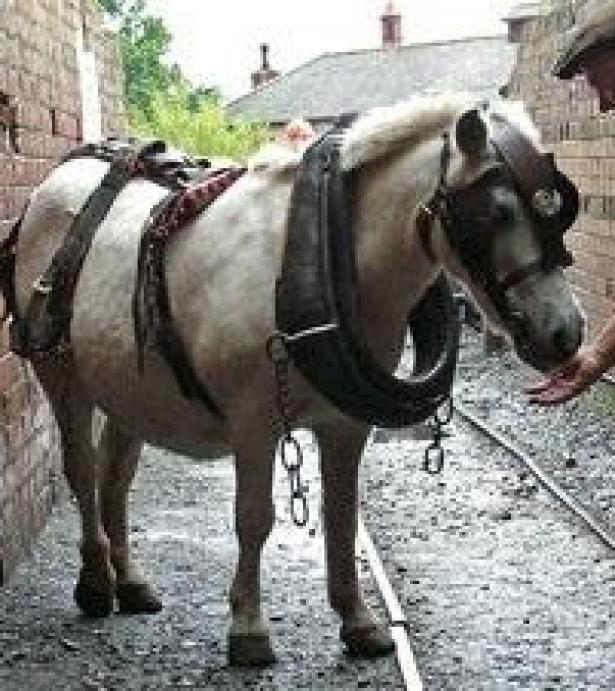The Story of Rex
There was Rex, the Shetland pony who hauled coal in a small shaft mine near Bicknell, Indiana. On June 2, 1923, Rex and three miners - James Bertillo, Frank Maberto, and Joe Benardi - were entombed in the mine as a result of a shaft cave-in. For many hours it was feared that men and pony were dead, but a tube forced through the debris enabled rescuers to hear the voice of one of the entombed. Rescuers worked uninterruptedly boring a hole big enough for the men to squeeze through. It was a slow process, and meanwhile the trapped miners were fed soup and other food through a pipe. At the same time shelled corn was dropped down for Rex, but this had to be abandoned because the corn clogged the pipe. So the men shared their soup with Rex who reciprocated by permitting them to huddle close to his warm body.
At length, after three days, the hole was big enough for the trapped miners to crawl through and they were hoisted to the top. The last man to crawl to safety looked back and saw Rex staring at him and, no doubt, wondering why he, too, could not be rescued.
Safety engineers, finding the shaft in a dangerous condition, decided to leave Rex to his fate. But in response to a universal demand that Rex be rescued at any risk, the company finally posted a two-hundred dollar reward for the pony's rescue.
The task was undertaken, but had to be temporarily halted because of blackdamp after twelve hours' effort. A corn shredder with a powerful blower helped restore circulation and enabled resumption of the rescue work. Ten days after his imprisonment rescuers finally broke into the tunnel and there, staring at them from the other side of the hole, was Rex, still alive and apparently none the worse for his experience. The hole was enlarged, and he was hauled to the surface by a pulley.
News of the rescue spread throughout the countryside and within a short time several thousand persons swarmed to the mine. An impromptu parade was formed which, led by a band, swung down Bicknell's main street. At the head of it, cheered by throngs on the sidewalks, was Rex flanked by joyous children.
From then on, Rex became the pet of the whole town. He had a stall of his own in one of the local stables, the expense of which was borne by the five miners who had risked their own lives to rescue him.
A year went by and hard times hit Bicknell. Its mine shut down, and the miners were out of work. Rex's board bill became overdue. Word reached Rex's five rescuers, all jobless and broke, that their pet was about to be put on the auction block in order to pay his board bill. They could not bear to have Rex sold to strangers and so they made a collection.
Rex returned the equine hero of Bicknell's miners and children until his death, which occurred in 1935 - twelve years after his rescue.
From: Coal Dust on the Fiddle : Songs and Stories of the Bituminous Industry by George Korson, c1943. (George Korson, author of Minstrels of the Mine Patch and Black Rock, was known as "the folklorist of the coalfields.")
The Last Pony Mine
Prior to engines being used by coal miners, little Shetland ponies, known as pit ponies, were used to pull carts loaded with coal through the low-roofed mines. The last pony mine in America was the New Gladstone Coal Mine in Appanoose County, Iowa, which shut down its operations in 1971, ending an era of pony mining.
--The Last Pony Mine (Americana Series; 30 min. documentary film, Iowa State University)
A Union Holiday Message
During this joyful holiday season, our union extends our best wishes for a healthy and happy new year to you, your friends and family. As we celebrate in our different ways, we can all be thankful for the solidarity that gives us strength to fight for what is right. May the spirit of our shared belief in justice spread throughout your workplace and across the land and generate peace in our world.
Source: National Association of Letter Carriers, AFL-CIO
Friday's Labor Folklore is a weekly newsletter which brings a ray of light and some cheer to its readers. It is inspired by Con Carbon - the Minstrel of the Mine Patch - a breaker boy from Anthracite Pennsylvania who believed in working-class solidarity, heritage and tradition. Stories and songs are delivered to your mailbox every Friday morning. It's free! -- Saul Schniderman, editor.
For back selected back issues, for a song, and a way to subscribe, click https://conta.cc/2L0gO8m


Spread the word